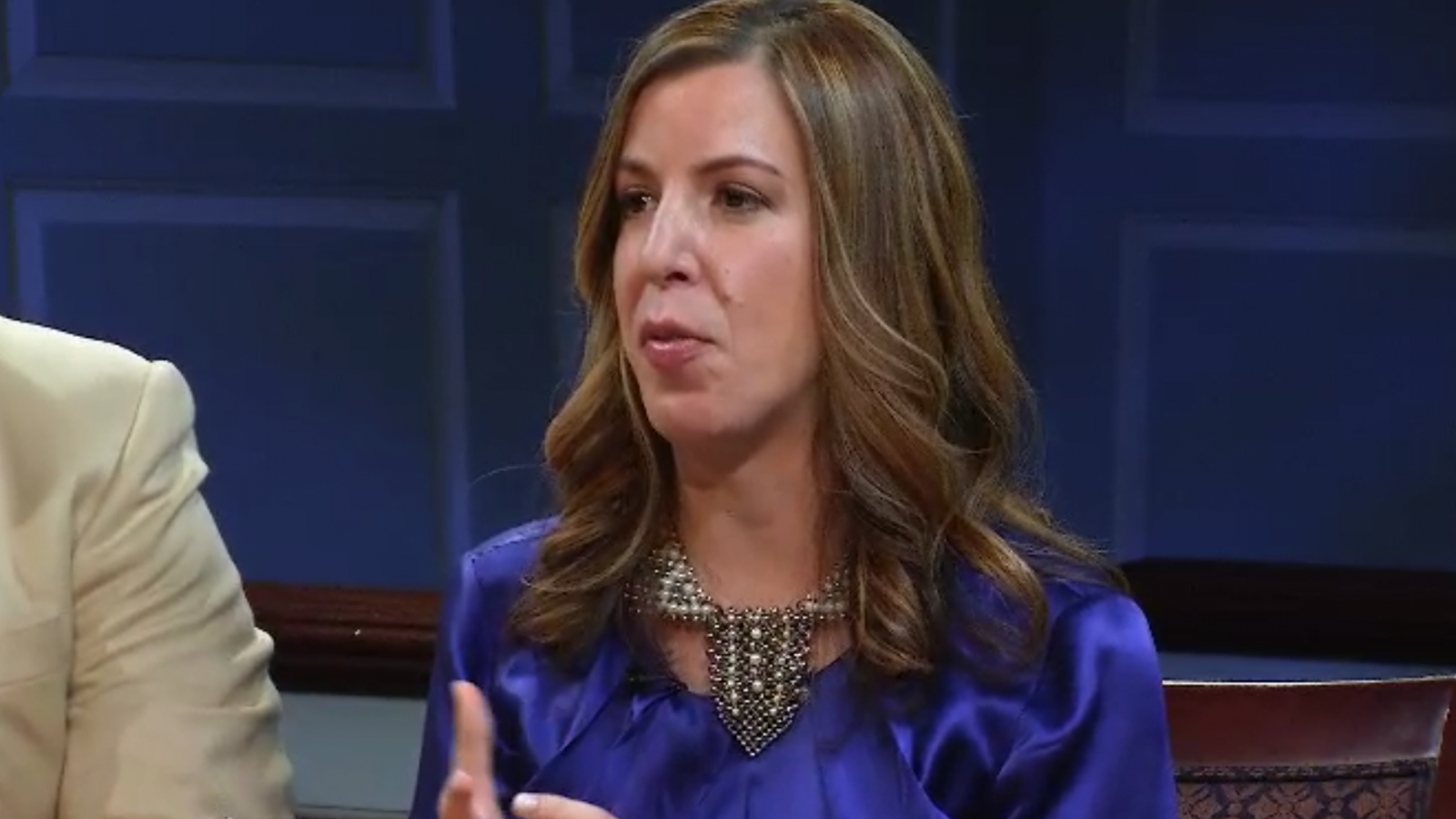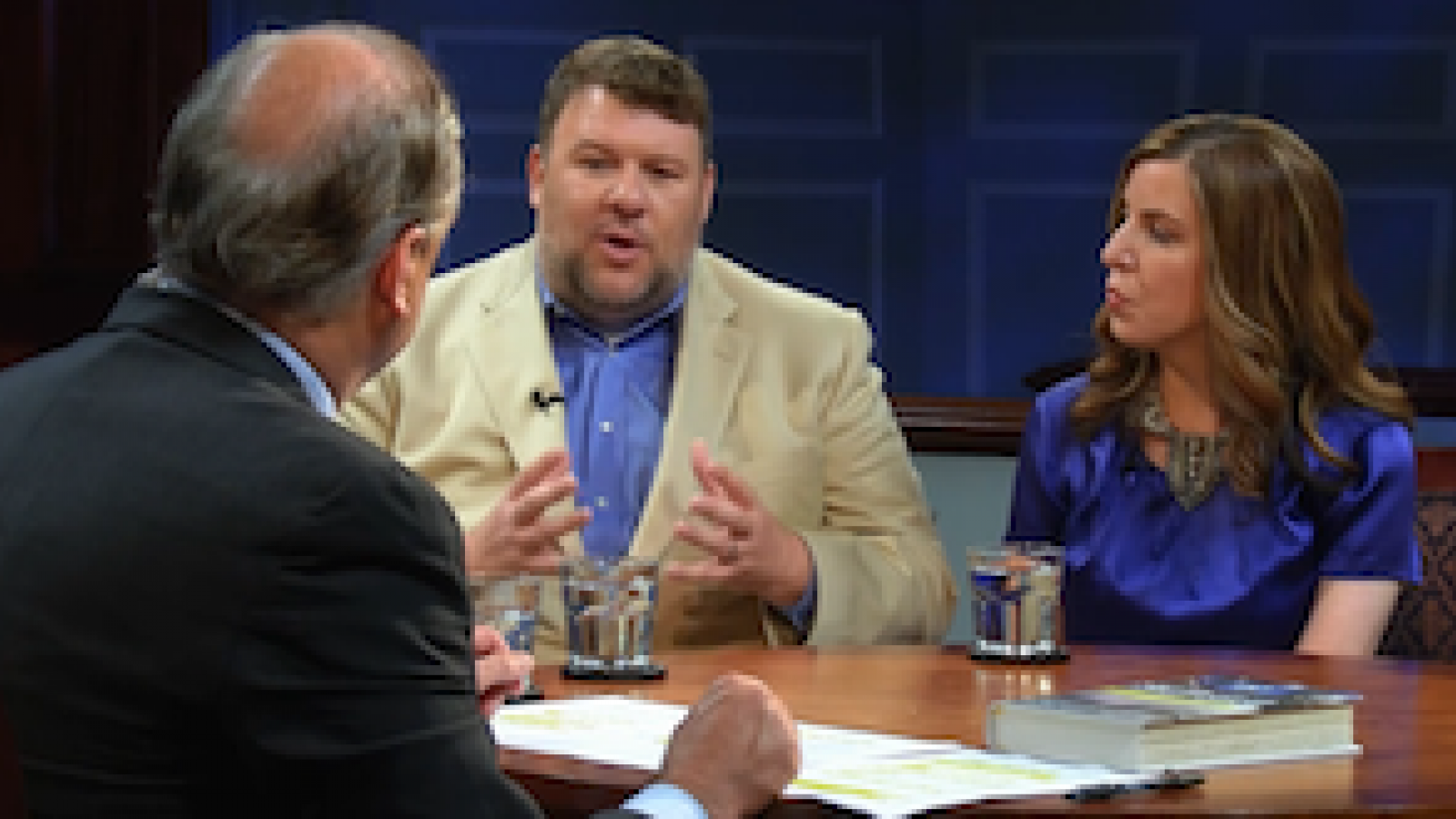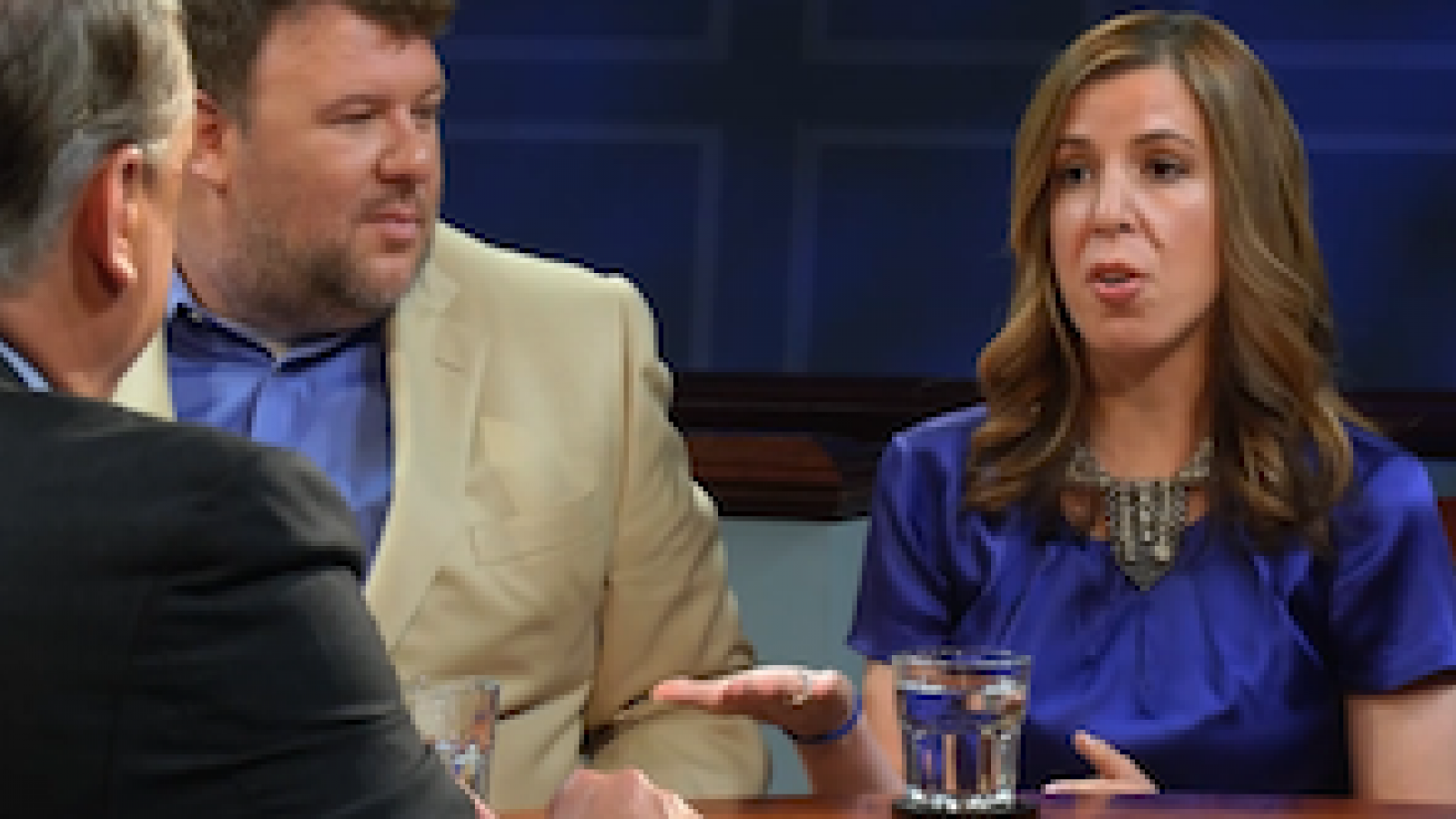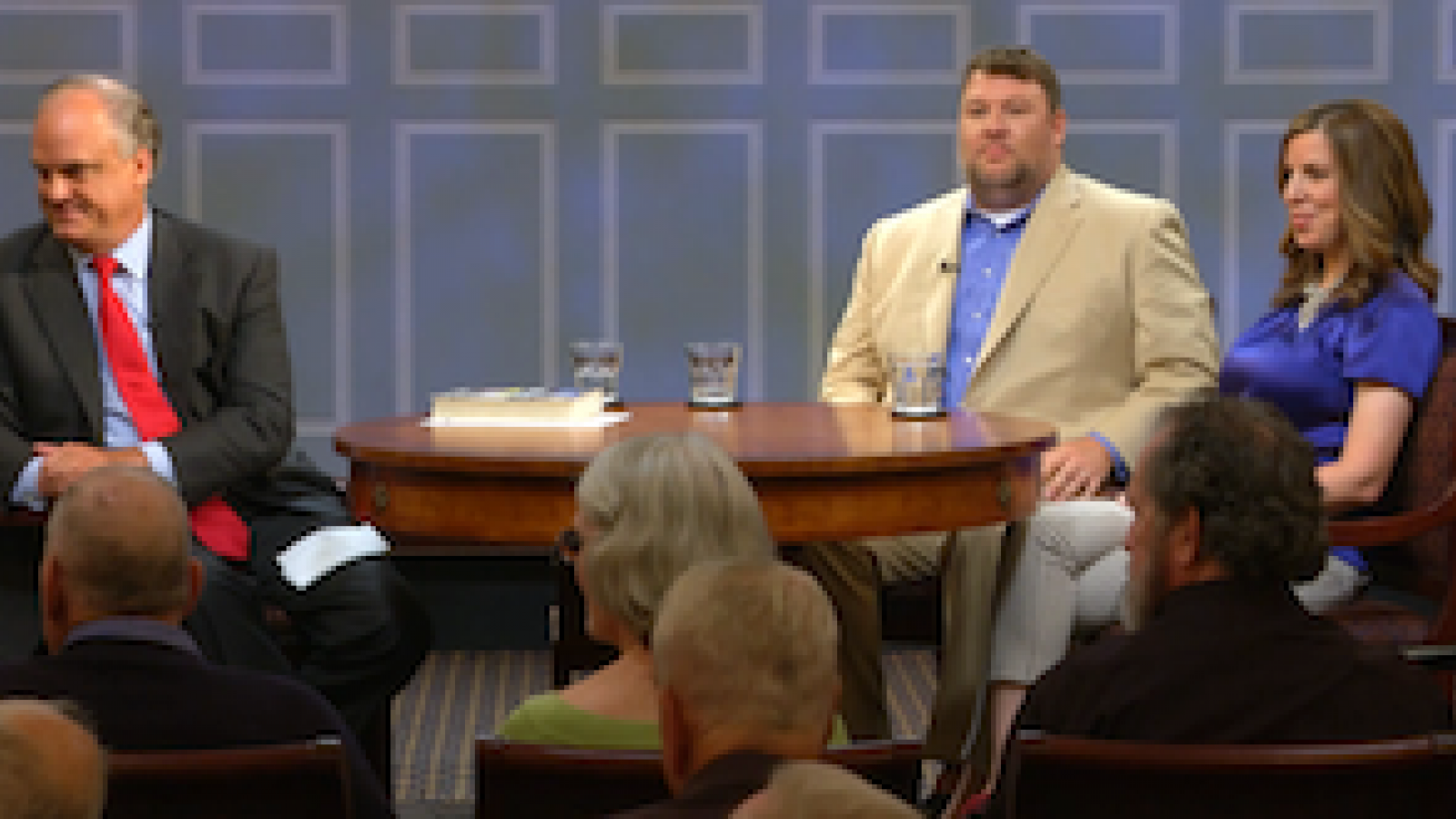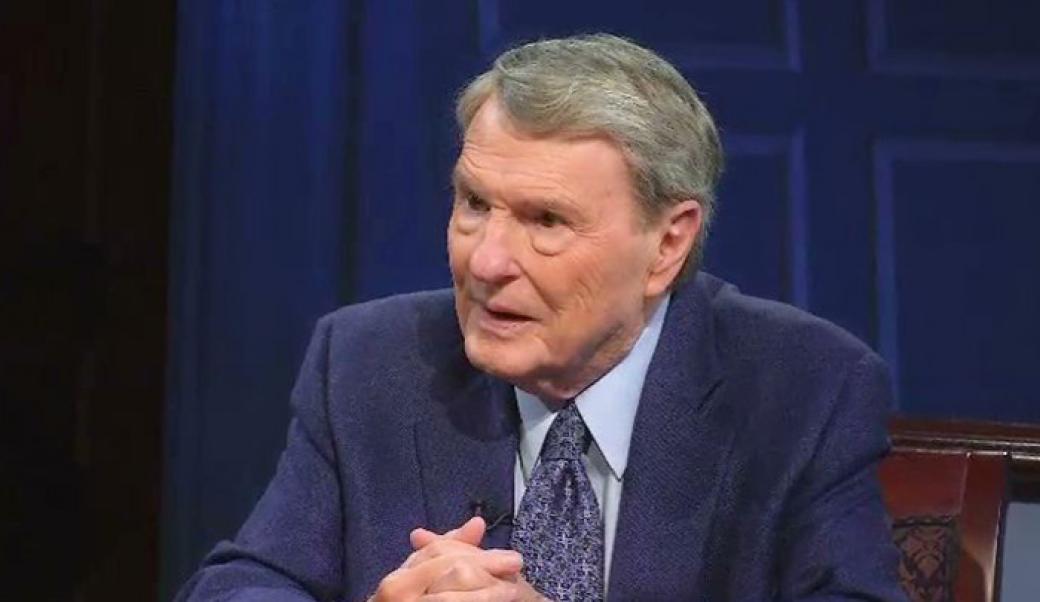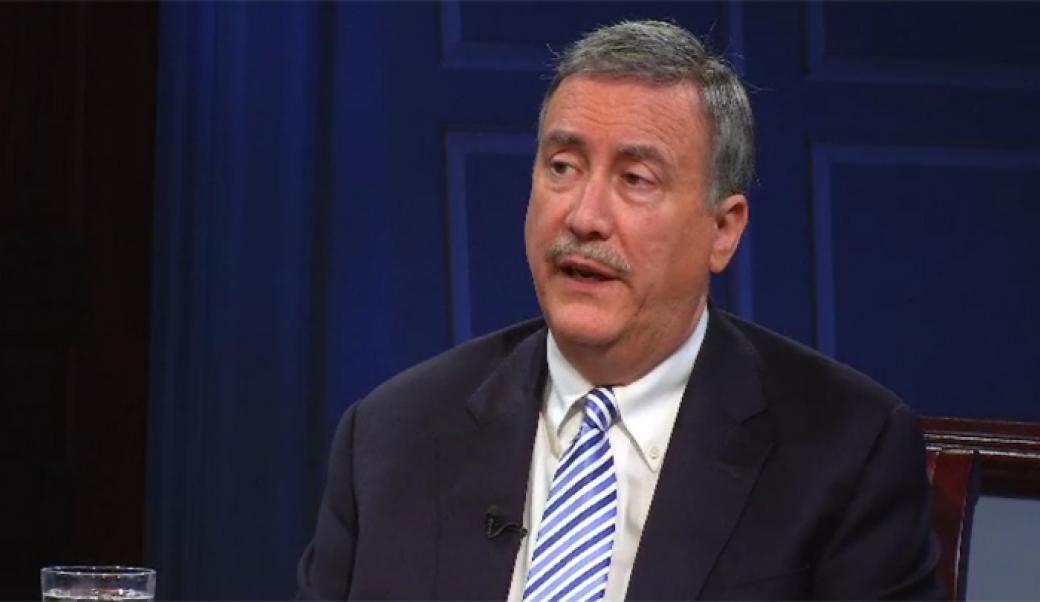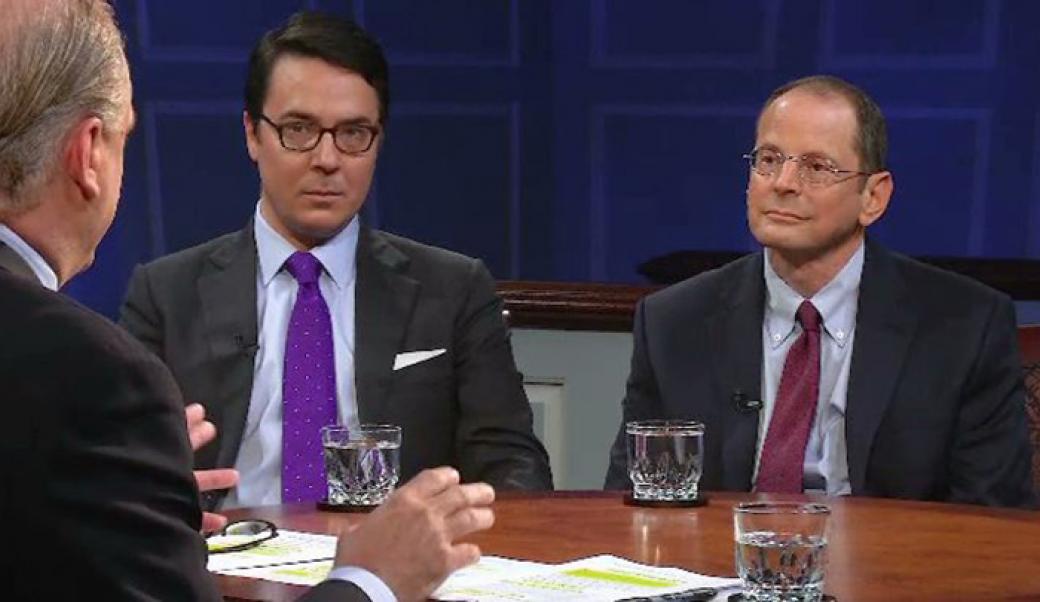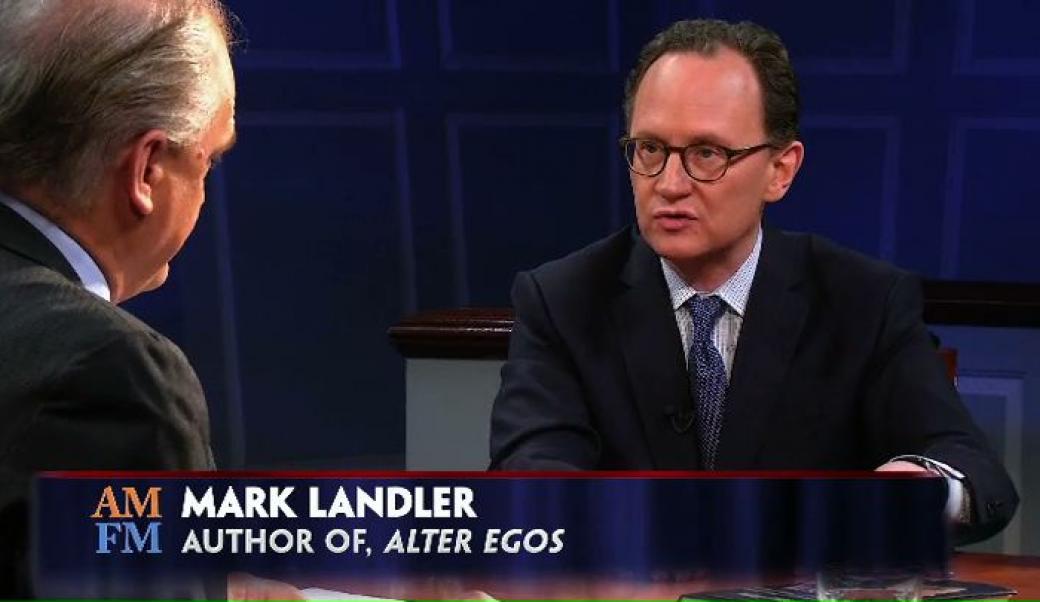About this episode
September 17, 2017
Jonathan Allen and Amie Parnes
When a political candidate loses a close election, whose fault is it? And how much does that really matter? We like to believe that our political system shakes out the realities of our candidates, exposing them for who they really are, and that, in the end, who wins or loses simply boils down to whether the people liked what they saw. Understanding why 2016 turned out the way it did will be crucial to every potential future candidate, including President Trump. Our guests in this week’s episode are Washington political reporters Jonathan Allen and Amie Parnes. They covered the election and are the authors of "Shattered: Inside Hillary Clinton’s Doomed Campaign."
Politics
How did Hillary Clinton lose in 2016?
Transcript
0:41 Douglas Blackmon: Welcome back to American Forum. I’m Doug Blackmon. When a political candidate loses a close election, whose fault is it, and how much does that really matter? We like to believe that our brutal political system shakes out the realities of our candidates, exposing them for who they really are, the good and the bad, and that, in the end, who wins or loses simply boils down to whether the people liked what they saw. But what about an election like 2016? The loser, Hillary Clinton, actually won three million more votes than the winner, Donald Trump. In fact, Clinton won more votes than any Republican candidate for president in all of American history. Did Donald Trump win on a technicality? Did Clinton blow it, or was she simply unelectable?
FACTOID: Trump won electoral college with 306 votes, Clinton received 232
Almost a year later, President Trump himself still repeatedly brings up his unexpected victory, usually as proof that any setback he suffers is really the result of Democratic sour grapes over, as he has said so many times, an election Hillary Clinton shouldn’t have lost. Now, with the President’s approval ratings at historic lows, open warfare between him and many in his own party, the 2020 Presidential campaign is already cranking up.
FACTOID: Trump approval rating averaged below 40% in September 2017
Answering these questions and understanding why 2016 turned out the way it did will be crucial to every potential candidate including President Trump. Our guests in this episode are Washington political reporters Jonathan Allen and Amie Parnes. They covered the 2016 election and are the authors of Shattered: Inside Hillary Clinton’s Doomed Campaign. Thank you for being here.
Jonathan Allen: Thanks for having us.
Amie Parnes: Thank you.
2:19 Blackmon: So yesterday, a viewer of the program saw something about that you guys were going to be guests on the show and tweeted, uh, that, you know, how could we organize a program about Hillary Clinton’s “failed” campaign when, in fact, according to this viewer she won. And so—and then, someone else chimed in and said, “She won. The reason she didn’t become president is actually because of Russian tampering, rigged voting in Wisconsin and Michigan, etc., etc.” You guys have to get reactions like that fairly often to the book, but what—so what do you say to the person who says, “She didn’t lose, it was stolen?”
Parnes: Well, she did lose, actually, because in this nation we, uh, rely on Electoral College to, um, elect a president. I think, Jon and I like to say that not only should she have won, but she should have killed him. (laughs) It should have—she should have slaughtered him. Uh, it was hers to win, and she lost.
3:17 Blackmon: And you mean that, “Should have won, should have slaughtered him,” not in the—not in who you think would have been the best president—
Parnes: No.
Blackmon: —but just in terms of two football teams on the field, which one is obviously the one that’s going to win the Super Bowl. In this case, that was Hillary Clinton that was obviously supposed to win based on the talent she had, the situation, who the opponent was. It was, hands down, all her.
Parnes: Everything was in her favor. Oh, yeah, she had the star power behind her. She had a very popular president in Barack Obama, his wife, Michelle Obama, a string of surrogates, um, a huge—you know, her Brooklyn headquarters, thousands of, you know, people worked there, and she had—she had the money. She had everything behind her, the infrastructure. So, yeah, I think it was hers to lose.
Allen: Uh, I mean, I think the way that we look at it—and it comes through in the book—is, uh, that Hillary Clinton inflicted a lot of wounds on herself that were unnecessary that put her in a position to lose to Donald Trump on an election day that really, given the numbers, could have—could have gone either way, I mean, talking about 70,000 votes over a few states. Number one, uh, she failed to put together a coherent message about what—what she was going to do for the country. Donald Trump was very good at that. Whether or not you agreed with him, he was very good at messaging what he wanted to bring. We understood, uh, that he meant to say he wanted to—to have a sort of more nationalist view of the world, right? “We’re going to end the trade deals. We’re going to erect a border wall.” The economic policies had a more populist flair, so you could see what he was doing with that. Her—on her side, there was never that articulation, and that’s not our judgment. That’s what the people who were closest to her told us, uh, in the course of reporting on the book, so there’s that. There is, uh, the email scandal, completely self-inflicted, where she set up an email server that ended up—outside of the government system that ended up having classified material on it. When she says Jim Comey is responsible for her loss, we wouldn’t know about Jim Comey were it not for the email server that she set up, we believe, in an effort to circumvent Freedom of Information Act requests by reporters, um, and then, number three, the speeches that she gave to Wall Street banks at a time of rising populism, as she was preparing to run for the presidency. She essentially prioritized her own financial gain over the best political sense, which would have been, obviously, not to give private speeches to Goldman Sachs and not release the transcripts.
5:50 Blackmon: Well, and—and I want to work through some of those specific, uh, points that you make just sort of the argument that you make a little more methodically, but also we should say that Hillary Clinton’s own book, her own account of—of this and what happened, uh, is just about to hit bookstores or will be hitting them as, uh—as this episode airs. There has already been some disclosure of what’s in the book and some of the arguments that she makes, some of which she has been saying for some time now. But one of the key things that she does make a point of, I think, in the new book, uh, is that—I have a quote in here somewhere, but essentially some of it—she—she acknowledges some of the things you say. I think she particular acknowledges, uh, messaging problems, uh, and some of those sorts of factors, but then she says, “In the end, some of it was also simply because I'm a woman,” uh, that basic idea. And it does suggest the—or—an election like this where the odds are so greatly in favor of one side in terms of the basic math and tactics and strategy and how it ought to turn out, uh, is it fair to say that the—that the gender question could well be a—a substantial part of the whole explanation, that that’s what made her vulnerable to—to these mistakes that you—that you outlined very precisely?
Parnes: Sure. I—I think we definitely think it was a factor. Uh, we talk a little bit about that in the book, how she acknowledges that at one event and kind of acknowledges what it would be like to have a female commander-in-chief, um, in a room full of veterans, but I think what she suffered from was a likability problem. Um, I think one of the most underrated stories of this election was the fact that she couldn’t turn out millennial women. Uh, for whatever reason, they just didn’t feel inspired to vote for her. They thought that—a lot of them were Bernie Sanders supporters, and they just—you know, they thought for whatever reason they’ll see another woman, uh, president in their lifetime, and they didn’t feel compelled to vote for her.
FACTOID: Clinton won 55% of young adults, Trump got 37% of 18-29 year-olds
That was a problem, the fact that she couldn’t, uh, you know, turn these people out for her. And—and I found that, as a woman, shocking in a way, because I thought, you know, “Here’s a woman who is actually—” we talked about this last time we were here. She didn’t really acknowledge the fact, what she did last time, the fact that she was a female candidate. She did that this time. I thought, “Surely she’ll be able to lure some support that way,” and she didn’t.
8:20 Blackmon: Well, and it was fascinating to me, um, uh, on the same lines that the—so that, in the end, the gender problem is not so much—was not primarily, if what you’re saying is right, uh, the question of or the problem of old-fashioned sexist voters not being willing to look at a woman.
FACTOID: 54% of women voted for Clinton, compared to 42% for Trump
Maybe that is a part of it, but the bigger problem being that progressive-minded feminist voters, a certain category of them being unwilling to vote for a woman, that’s a—that’s a really remarkable double irony.
Allen: Yeah. I mean, it’s interesting. We, uh—we did an event right after the book was released, uh, in Boston, and, uh—and, uh, we were asked a similar question about sexism, and, uh, knowing I was taking a risk in answering the question instead of just deferring to Amie to do it, um, you know, I said—I said—somebody said, you know, “Is it sexist that you’ve—that you’ve criticized her for her campaign management and for her message and for all of these other things in the book?” I said, “I think it would be sexist if we didn’t,” um, and—and I don’t mean to—to turn that around in quite so easy a way, so let me explain that a little bit. I think there were two questions here. Uh, number one, does sex—does sexism contribute to, uh, the difficulty that a lot of Americans have with Hillary Clinton? I think also—the question—the answer to that is absolutely, and over the—especially over the course of the last 25 years. When she first came into the picture, the idea of having, um, an educated and, uh, partner-type wife for a presidential candidate was great for Bill Clinton in the Democratic primary and bad for him in the general election, and we saw that transition of Hillary Clinton over the course of that campaign in 1992. By now, the idea of having a wife who is a professional is not, uh—is not a problem for the American public. So Hillary Clinton was judged on a—I think, on a different level, uh, just because of where we were societally 25 years ago, and you kind of rack up all that baggage over time.
However, in terms of elections, your job as a candidate is to get people to vote for you because of, despite whatever your character traits are, whatever your—you know, the God-given attributes are, and she was unable to do that. She was unable to turn whatever sexism there was into an advantage, um, which is what a candidate should be trying to do. They should be trying to say, “Look, here’s the sexism that’s happening, and here’s my answer to it,” or to avoid the subject entirely. Barack Obama, uh, was the first African American president of the United States. The country is 12 percent African American. You know, the idea—and the country is, uh, majority female, so the idea that it would be impossible for a woman to win or that, uh—or that she’s not responsible for her own shortcomings in getting the voters to vote for her, I think, is incomplete at best.
11:07 Blackmon: A consistent theme, uh, from both 2008, uh, with Hillary Clinton and, uh, 2016, uh, boils down to, uh, poor choices for people in key positions, it seems, and then an unwillingness to ditch them when the evidence begins to grow that, uh—that things are not going the right way, but just a really basic—picking the wrong people and then being too loyal to them, right?
Parnes: Right. I mean, she brought in—she kind of learned a lesson in bringing in new blood, fresh blood, so she does. She brings in a lot of Obama people, uh, but it turns out that they don’t exactly mesh well with the other people because in Clinton world you have a breakdown of—especially in her world, you have, A, Bill Clinton’s world, and then you have Hillary Clinton’s world. You have her State Department, uh, employees. You have her—her ’08 employees, and you have her Senate office, so all these people come together, and they don’t quite play well together. So you have that dynamic, but I think what she did was she tried to learn her lesson and tried to kind of eliminate what was going wrong. She—she was doing—making kind of private decisions behind the scenes, you know. Publicly, it was, “Everything is great. You know, this campaign is being run smoothly. It’s nothing like ’08.” But behind the scenes, she has—she has created a Super Six, a board of directors. When things have been going wrong, she takes some responsibility away from some people, from Robby Mook, for instance, uh, gives more people to Jake Sullivan, her policy advisor, and no—none of the—the public has no idea that this is happening. But, yes, I think you’re right in that she still has problems. Uh, one thing that, you know, follows her from ’08 is the fact that she can’t quite ditch the people who aren’t good for her even in this time around.
12:53 Blackmon: Yeah, and the—and the—in—in ’08, that was the campaign manager, Patti Solis Doyle, you know, who—and who she is insistently hanging on to until way past almost every—every political operator is saying she’s—I mean, she probably had lost by then already, uh, in 2008 but then finally ditches, uh, this campaign manager but who she had a long, very deep personal relationship with. And then, in 2016, uh, despite having ostensibly learned these lessons, uh, it’s different in some ways, but you still have characters like Huma Abedin, you know, this incredibly close, almost daughter-like person who has been her advisor, who she just can’t let go even after she has become politically toxic.
FACTOID: Huma Abedin served as vice chair of Hillary Clinton’s 2016 campaign
Allen: Uh, it’s amazing. And, you know, one of the early excerpts that came out from Hillary Clinton’s book, uh, has a scene where Huma Abedin is crying on Hillary Clinton’s shoulder after the final, uh, Anthony Weiner, uh, text messaging blow-up, and it’s amazing. That’s the point at which Huma Abedin was sort of—not excommunicated but taken off the campaign trail so that, at least, she wouldn’t be a visible reminder of what was going on. And—
13:59 Blackmon: No more photographs of her and candidate Clinton outside the airplane. I mean, that’s really—
Parnes: Right.
Blackmon: —what that boiled down to.
Allen: Right. And—and still, Hillary Clinton is saying—you know, basically saying, “I never left Huma. I never abandoned her.” At the same time, she’s writing about her aide’s incredibly painful moment in her own book, um, but also, I think, you know, what’s interesting about that is—you could have anybody you want around you. The question is who are you empowering to make decisions. So if she wants Huma Abedin around her because she is, uh—provides some sort of support or comfort or even a mental Rolodex of who the Clintons’ friends and enemies are, all of that is great. But the complaint we heard time and again was, uh—from people inside the campaign is that Abedin not only acted as a gatekeeper and a sort of translator but, uh, often made decisions that were outside her purview, and they couldn’t ever tell—I shouldn’t say “ever tell,” but they often couldn’t tell whether a decision was being made by Hillary Clinton and translated by Huma Abedin or actually being made by Huma Abedin.
14:58 Blackmon: Just a reminder of who Huma Abedin is, she’s this close aide to Hillary Clinton but also the wife—uh, at the time—of Congress—former, by then—former Congressman Anthony Weiner who, uh, was caught up in the scandal of texting sexual images of his body to, uh, random women. Uh, and, uh, that’s the scandal that we’re talking about.
Allen: Also what was interesting is our—our understanding from our sources is that when she was—when Huma Abedin was finally pushed off the campaign trail, uh, contrary to what this latest excerpt suggests from—from Hillary Clinton’s book, this was done with Hillary Clinton’s blessing if not instruction, if not explicit instruction. Uh, and basically, uh, Huma Abedin came to her colleagues and said, you know, “Do—do with me what you will,” and the answer was, “Get off the trial.” Uh, but—but that doesn’t happen without Hillary Clinton thinking that’s the right answer.
15:49 Blackmon: An astonishing thing to me—uh, I don’t think it’s in your book—um, uh, was that at the Democratic National Convention in the summer, uh, I was there doing some reporting for this—another project of mine, uh, but I was in the suite of Debbie Wasserman Schultz, still the DNC chair, um, and then later, in the—in the Obama suite, not with the Obamas, but I was sitting with Valerie—behind Valerie Jarrett, and, you know, this inner circle of the— of the Obamaistas. And I turned around at one point, walk out in the hallway, and Anthony Weiner, the congressman, the disgraced congressman, is there, is standing there. (laughs) And I turn around and said to—to the people I was with—I said, “How can—how can this—how could the Democratic Party possibly—who could have possibly allowed this to happen?” This is the most secure place on the planet at the time, uh, that—and how is it that this politically toxic, dangerous, dangerously—uh, dangerous liability to any Democrat can be—be here? And someone actually said to me, “Well, there are some people you just can’t tell they have to go away.” (laughs) I was astonished.
Allen: Well, as long as they took his smart phone away on the way in.c
16:51 Blackmon: So there are these poor campaign choices in terms of people. There’s a slowness to move. At times there’s over-loyalty, perhaps, to certain people, but you also have some very basic things that—like the emails server, for instance, where in the end the email server—as I understand it, the classified material, uh, was innocuous. It’s mostly references to media stories about drones during the time that drones were still not acknowledged to exist by the United—by the U.S. government. But the—so, in the end, the content, the—of the material that ends up on the server is not really the issue. You know, there—there aren’t Benghazi emails that—that—of her stan—telling the—telling the military to stand down and let people die in Benghazi, none of the things that—that her opponents imagined were there, uh, but simply the decision to do things the way they were done becomes this crippling issue.
FACTOID: Four Americans were killed at U.S. mission in Benghazi in 2012
Parnes: Yeah, because it follows her into, um—throughout the summer, people are talking about it. News stories are generated, and they fail to actually get a grip on it. And the—the Clintons themselves don’t understand why this is a problem. In the beginning, they think, “Oh, it’s just going to blow over,” and even, um, during the summer a lot of her senior aides are trying to get her to address it and to talk about it more and get out in front of it, and she and her husband are saying, “We did nothing wrong. Why should we do this?” It takes until September, the beginning of September, around this time, um, for her to finally, um, address it and to actually say, “This is what happened.” And even then, it takes her a couple of times. She can’t get it right. The tone is off.
Allen: Hillary Clinton understands how information works. So whether or not she understands how the device works, she very well understands the power of Freedom of Information Act requests as somebody who has watched every word she’s ever written brought out against her in the past. She is somebody who, um—you know, who, after the 2008 campaign, uh, had aides download the messages of her other campaign staff so she could read through them and see who was leaking and who was saying bad stuff about her and about each other, somebody who’s very, very aware of how powerful information is, how it moves. And the idea that, um, you know—I think the idea that she just didn’t have a clue about this and that the people around her just didn’t have a clue about this and kind of backed into it is at odds with any history that we’ve seen.
19:16 Blackmon: Talk about the role of Bill Clinton. Where does he fit into this, and how much of the why-she-lost story should be sitting in front of—the—the blame should be at the feet of Bill Clinton?
Parnes: Well, I think they looked at 2008, um, when they performed their initial autopsy of that campaign and said that he was problematic, that he contributed to her loss, and so they tried to, um—they tried a different role for him this time around. They wanted him to be more private. He was definitely, uh, very active behind the scenes, but you wouldn’t know as much. And I remember at the time, donors, in particular, were saying, “Where is he?” because they were—they kind of wanted that, the glad-handing, you know, the stuff that Bill Clinton does so well, and that was—and the stuff that she doesn’t do well, frankly. And so I think, uh—you know, so he was missing for a large part of the campaign until, basically, the primary, the Iowa Caucus. Uh, and then, they started doing events with him, and they kept a pretty tight leash on him. They didn’t want him out there talking. He did interviews with the press, obviously, because he loves that rope-line atmosphere, so you—you found him doing a lot of that, but they—they really kept him on a tighter leash this time. And the funny part is that, you know, there are times where he is spot-on. You know he’s the one who is understanding what’s happening. He sees Brexit happening. He sees that something is amiss on the campaign. He is sounding the alarm bells in certain ways and saying, “Hey, I’m talking to people on the ground here in X state. Uh, you know, something is off, and we need to be doing more of this.” And I think he was—the campaign kind of said, “Oh, that’s—that’s really cute and all, but, you know, we kind of have this covered,” and they were relying on—over-relying on data, uh, to support their belief that they had this when, in fact, they hadn’t.
21:07 Blackmon: In the end, you want to say, “Oh, it’s the Electoral College,” or, you know, in the funkiness of this thing, the—the mathematical alg—the flawed algorithm of the—of the Electoral College, or, “It was Russian tampering,” if you want to believe that, or, “It was Benghazi and the email server,” or it was—
Parnes: It’s all of those.
Blackmon: It’s all of those things. Yeah, all of those variables, even though you come down to the equivalent of a one-vote—it effectively is a kind of one-vote outcome, but we really don’t—any one of those things, had it been different or even if the election had been one day later or one day earlier, I mean—any of those variables, the tiniest change to them might very well have ended up as a—as a completely different outcome, right?
Parnes: Oh, yeah, and Bernie Sanders was a big one, and she talks about this in an excerpt that came out a couple days ago. And we talk about it a lot about in the book, but he—at the end of the campaign, the primary, he’s really hammering her and making a point that, you know—it does dovetail in a way with what Donald Trump is saying. He’s on the other side saying “Crooked Hillary,” and Bernie Sanders is essentially saying, you know, “You can’t trust her. She’s in cahoots with the big banks.
FACTOID: Clinton won Democratic nomination with margin of 900+ delegate votes
She’s, you know, doing all this stuff that we—we don’t believe in.” And so there—there’s a point to be made there, too, that at the end of the day Trump brought home Republicans, and she didn’t end up doing that with Democrats. Uh, a lot of the Bernie Sanders supporters stayed home or voted for a third-party candidate, uh, and that hurt her as well.
FACTOID: Third Party candidates received only 4% of popular vote in 2016
Allen: So yes, it hurt her at the end. One other thing to—to sort of, I think, think about as you look at that is, you know, the candidate that was in the news—I heard people talk about this a lot, and it’s true. The candidate who was in the news suffered. Um, whoever was the story of the day, whether—you know, on days where Donald Trump was in the midst of the news, he suffered. When she was in the midst of the news, she suffered, and the—the Comey storyline put her in the focus of the news for the last—you know, essentially the last week, uh, of the campaign, a week to 10 days, in a way that I don’t think was helpful to her.
23:08 Blackmon: Well, and you guys point out in the book, I think, one of—one of the interesting details is that—uh, that Republican polling, you know, sort of official, behind-the-scenes Republican polling at the very end, uh, is actually detecting that in Wisconsin and Michigan and these—that something unexpected might be happening, and they conceal that. They—you know, they don’t—they don’t publicly reveal it.
Parnes: Right. They didn’t think anyone would believe it.
Blackmon: Yeah, and there’s even this line—I think you quote somebody saying, “You know, if we can just—if we can just get him to shut the hell up, you know, if Trump will just keep his mouth shut, um, we may have a surprising outcome in these places.” Uh, and so—so, exactly what you say, he—he—him staying out of the news, her being pushed into the news, maybe it’s in those ways that the effect is most substantial.
Allen: And, by the way, he did at the end of the campaign. He did—he did beh—for lack of a better term, behave himself for the last week or so of the campaign in ways that he hadn’t previously. He was a con—a more contained version of Donald Trump right at the end. Um, I think it’s amazing you have two ca—two campaigns, two sides that both look at a campaign at the end and think to themselves, “God, I hope my candidate is not in the news today.” (laughs) You’ve got to be able to tell voters why you’re running for president and what you’re going to do for them, and I think Hillary Clinton struggled with that. I think in her own mind she—she knew what she wanted to do for them. There were a million different policies, uh, but I don’t think that voters were able to identify what it was she was saying that she was going to do for them. And, you know, even something so simple as the slogan “I’m with Her” was about her, and, you know, I think—I think candidates have to figure out what they’re about. So some of it’s that values question of what do the Democrats stand for, and some of it is the forward projection of what do those values mean for what I’m going to do for you, um, and—and that would be the sort of big takeaway. And the—the other thing is the very simple, basic idea in politics. You want to win a party primary? You’ve got to be somebody who can bring people together and—and at least paper over their differences on major questions. And if you want to win the general election, you’ve got to be able to do the same thing. I think we saw an anomal—anomalous election in 2016, uh, where—where there was a lot more vote than there usually is against candidates.
Blackmon: Jon Allen, Amie Parnes, thanks for joining us.
Allen: Thank you.
Blackmon: For future episodes of American Forum, watch us every week on your local PBS station, or watch our tapings live at the Miller Center Facebook page. If you have a comment or suggestion, you can reach me on Twitter, @DouglasBlackmon. You can get Jonathan Allen with @JonAllenDC, and Amie Parnes’s Twitter handle is @AmieParnes. See you next week. (applause)
